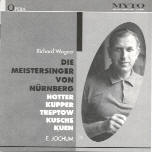Recorded at a December, 1949, performance, this Meistersinger has just about everything going for it. The sound is quite good for its provenance–better, in fact, than the 1956 Bayreuth Meistersinger. I mention the latter because it also preserves Hans Hotter’s Hans Sachs complete. He’s in far better voice here, though. The role’s intimate, interior moments particularly illustrate Hotter’s unusual care with words. The opera’s pair of lovers is also strong. Meistersinger buffs will recall Gunther Treptow’s ringing Walther from Decca’s 1949/50 Knappertsbusch version, or Benno Kusche’s dark-toned, scheming Beckmesser from Kempe’s classic EMI recording. But what a difference it makes to put these singers in front of an audience–and the differences are revealing. One can say the same for Eugen Jochum, who led a very fine studio Meistersinger in 1975. Yet his younger counterpart brings added warmth to the complex orchestral strands, in addition to perfect tempo choices and flowing, unpressured phrasing all around. The filler, a 1944 “Wotan’s Farewell” from Die Walküre (with Heinrich Hollreiser leading the Bavarian Radio Orchestra), captures Hotter at his youthful best. No texts or translations are included.
































